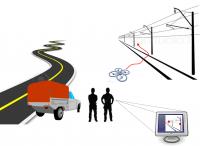Nonlinear control for commercial drones in autonomous railway maintenance

Drones are getting widespread and low-cost platforms already offer good flight and video recording experience. This project intends to use such drones in the context of railway maintenance by developing applications for autonomous navigation in railway environment.
The primary focus of the project is to perform vision-based navigation for infrastructure inspection. Using the libraries of ROS and OpenCV, object detection methods (using feature detectors, optical flow, classifiers,...) are studied and implemented for target detection, target/rail track following and obstacle detection purposes. These methods will serve for basic demonstrative use-cases, showing the autonomy of drones in short-range inspection and long-range track following applications.
Furthermore, building upon the above vision-based navigation toolset that we implement, optimization techniques are developed and evaluated for the flight trajectory tracking and planning tasks. In this context, we will investigate commonly used planning methods like RRT or MPC techniques and compare them to the novel optimistic planning algorithms. Specifically, we focus on developing methods for planning under communication or computational constraints, common situations in remote control applications or in case of lightweight drones.
This project has been supported by a grant from Siemens, reference no. 7472/3202246859 and is part of the international Rail Automation Graduate School (iRAGS).
